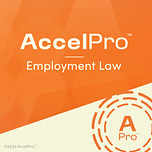Welcome to AccelPro Employment Law, where we provide expert interviews and coaching to accelerate your professional development. Today, we are featuring a discussion with Maria Papasevastos.
Pay transparency is one of the most vexing issues faced by employment attorneys, companies and human resources executives. The rules vary from state to state, which is confusing enough on its own. It’s made doubly difficult because remote work means employers may be subject to laws in states in which they don’t operate. The legal complexities are compounded by cultural issues: Many employees are uncomfortable talking about how much money they make.
Our guest to sort through these issues is Maria Papasevastos. She is an Associate at Seyfarth who represents employers in multiple areas of employment law, including discrimination, harassment, retaliation and wage and hour matters.
We discuss the recent surge in adoption of pay transparency laws, the challenges employers face in complying with them and how years of performing ballet helped prepare Maria for a career in law. The supplemental materials and episode transcript are available below.
AccelPro’s expert interviews and coaching accelerate your professional development. Join AccelPro Employment Law now for a free trial of everything we offer to members.
Interview References
Maria Papasevastos’ Seyfarth profile
3:38 | New York City Pay Transparency Law, 2022/032 (2022).
4:52 | Iacoppeta, K., Papasevestos, M., Skahan, S., Tyman, A. (2022, December 13). Pay Transparency in 2023 [Webinar]. Seyfarth Shaw LLP.
5:37 | Colorado Equal Pay for Equal Work Act, Part 2, C.R.S. § 8-5-101 et seq. (2021).
5:37 | Washington Equal Pay and Opportunities Act, RCW 49.58 (2023).
11:20 | Papasevastos, Maria et al. (2019, May 28). Massachusetts Proposed Pay Scale Legislation - Part of National Trend?. Seyfarth Shaw LLP: News & Insights.
12:58 | Toutant, Charles. (2022, September 13). What Happens When Workers Know Each Other’s Salary? We’re About to Find Out as Wage Transparency Laws Spread. New Jersey Law Journal.
Supplemental Materials
Forrest, Brett. (2021, September 29). Nevada pay transparency law takes effect Oct. 1. KOLO 8 News Now.
(2022, December 26). New York State Enacts Pay Transparency Law. JD Supra.
TRANSCRIPT
I. PAY TRANSPARENCY LAWS - A NATIONAL PERSPECTIVE
Matt Crossman, Host: Let’s start with what’s happening nationwide with pay transparency laws. There has been quite a bit of change in the last few years. Colorado, Nevada, Connecticut, Washington, Massachusetts and New York have all adopted various pay transparency laws.
What is happening and why?
Maria Papasevastos: I think this is part of an overall focus on pay equity. The start of this was a focus on beefing up state pay equity laws. For example, New York went from a standard of comparing equal work to comparing substantially similar work. The next step was salary history ban laws. Legislatures found, if we ask individuals what their prior salary is, their salary going forward is going to be based on what they were making in their prior job. That means it may start at a lower rate than what other individuals are making.
I think pay transparency is really the next step in trying to achieve pay equity generally. It’s the next tool in trying to address this overall issue of pay equity, and legislatures seem to be following on this trend as a means to address this.
MC: I mentioned states that have adopted these new laws recently. For employers, hiring managers and human resources (HR) executives outside of those states who are watching this issue, do you expect these laws to become more common?
MP: Absolutely. There are a lot of states and other jurisdictions that have pending laws or have considered laws in the past like this. And even if you’re sitting in a state that doesn’t currently have this type of pay transparency law, given the world that we live in now, with remote workers and hybrid work, there is a chance that you may be subject to these types of laws anyway.
For example, if you’re a company based out of Texas, but you have this one employee in New York City, then you’re going to have to pay attention to the New York City law, and you’re going to have to comply with it for any of your remote positions that can be performed in New York City.
So I think this is an issue that really affects a lot of employers all across the nation.
—
II. THE HR PERSPECTIVE
MC: For an HR executive running a nationwide search, would it simply be easier for them to pick whatever rules are the most stringent and follow them because at some point they’re going to butt up against them?
MP: Yes. I think we’re really at that point now. In the beginning, I was hesitant to suggest that kind of approach and have the law in New York City dictating all of what you’re doing across the nation. But I think given the widespread nature of these laws, we’re at that tipping point. I have seen in my counseling practice a lot of employers considering doing that instead of a one-off approach or trying to comply with each law and each state.
MC: In a webinar on this topic, you said you’ve gotten a lot of questions from clients regarding exactly what they need to post regarding salary ranges and benefits. Let’s start with a broad view and we’ll dig deep after that. What do hiring managers and HR executives need to know and do to comply with these regulations?
MP: Generally what these laws require is for you to post the minimum and maximum salary that you expect to pay for the position, or reasonably expect to pay for the position, at the time you’re posting it.
It’s phrased in a couple different ways, but that’s the general gist of what is being required. Generally, it’s base salary. Now, Colorado and Washington have some separate requirements to provide a general description of benefits that you’re offering for the position, or a general description of other compensation.
So those types of nuances are something that people might bring into their postings anyway, to have a more nationwide approach and comply with all of the laws nationwide. And I think that makes sense from a recruiting perspective anyway. I think a lot of companies are already putting in their benefits information, or if employees qualify for a bonus or 401k. I haven’t seen too much pushback in those areas.
MC: What are some of the other challenges posed by how the rules are written? The one in Washington seemed pretty broad. You’ve written about some others that are pretty narrow, so what are some of the other challenges and how can HR executives deal with what must be some confusion about what exactly the rules say?
Listen to this episode with a 7-day free trial
Subscribe to AccelPro | Employment & Labor Law to listen to this post and get 7 days of free access to the full post archives.












